This Pew Research Center analysis focuses on public opinion of the United States and Joe Biden in 23 countries in North America, Europe, the Middle East, the Asia-Pacific region, sub-Saharan Africa and Latin America. The report explores views of the United States’ role in the world, including as an economic power, and perceptions of American society. This is the first year since 2019 that the Global Attitudes Survey has included countries from Africa and Latin America due to the coronavirus outbreak.
This report draws on nationally representative surveys of 27,285 adults conducted from Feb. 20 to May 22, 2023. All surveys were conducted over the phone with adults in Canada, France, Germany, Greece, Italy, Japan, the Netherlands, South Korea, Spain, Sweden and the United Kingdom. Surveys were conducted face to face in Hungary, Poland, India, Indonesia, Israel, Kenya, Nigeria, South Africa, Argentina, Brazil and Mexico. In Australia, we used a mixed-mode probability-based online panel.
Here are the questions used for the report, along with responses, and the survey methodology.
In the third year of his presidency, U.S. President Joe Biden receives mostly positive reviews from publics around the world. Across 23 countries in a new Pew Research Center survey, a median of 54% express confidence in Biden, while 39% say they lack confidence in him.
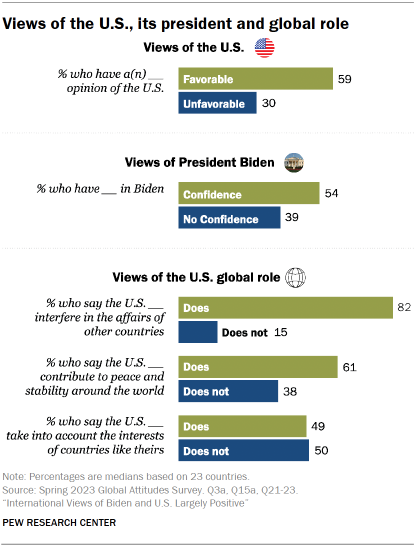
Similarly, overall views of the United States are largely positive: A median of 59% give the U.S. a favorable rating, including around seven-in-ten or more in Poland, Israel, South Korea, Nigeria, Japan and Kenya. Hungary is the only country surveyed where fewer than half see the U.S. favorably.
America’s actions on the world stage have often shaped its global image, and as the survey highlights, public opinion about U.S. foreign policy is often complex, with people seeing both positive and negative sides to American power. Overwhelmingly, people believe the U.S. interferes in the affairs of other countries – a median of 82% say it does this a great deal or fair amount – but most also believe the U.S. contributes to peace and stability around the world.
International public opinion is essentially divided over how much the U.S. considers the interests of other countries when it is making foreign policy decisions. However, in roughly half of the nations surveyed, the share of the public that thinks the U.S. does consider other countries is higher than it has ever been since Pew Research Center started asking this question more than two decades ago.
The survey also explores other aspects of American power, including elements of U.S. soft power. America’s technology, universities, military and entertainment are all seen as being the best or above average when compared with other wealthy nations, although the U.S. receives mixed reviews for its standard of living.
Perceptions of American economic power have increased in several countries over the past few years, and respondents tend to name the U.S., rather than China, as the world’s leading economic power. However, in a number of European countries, as well as Australia, China is considered the top global economy.
These findings come from a new Pew Research Center survey conducted from Feb. 20 to May 22, 2023, among 27,285 people in 23 countries, many of which are key U.S. allies. Below are some of the other findings regarding America’s overall image, ratings of Biden, views of U.S. foreign policy, American soft power and American economic power.
Overall ratings for the U.S.
Among the countries surveyed, Poland, where positive views of the U.S. have increased substantially since Russia’s invasion of Ukraine, gives the U.S. its highest rating: 93% of Poles express a favorable opinion. The U.S. gets its lowest marks in another central European country: Hungary, where just 44% of adults offer a positive view, down from 55% in 2022.
Elsewhere, views of the U.S. have mostly remained stable since last year, although favorable ratings have declined somewhat in Sweden, South Korea, Canada and Germany.
The current study includes eight middle-income nations that Pew Research Center has not surveyed since 2019, before the outbreak of COVID-19, due to the challenges of conducting face-to-face interviews during the pandemic. In all eight countries, there has been a significant increase in U.S. favorability since 2019. This is similar to the pattern found in Pew Research Center surveys over the past several years, which documented a decline in America’s global image during Donald Trump’s presidency and a rebound in ratings for the U.S. following the election of Joe Biden.
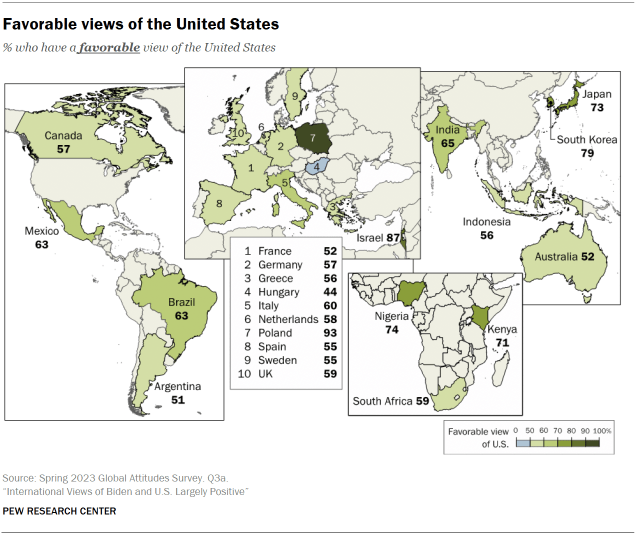
Attitudes toward Biden
As with ratings for the U.S. overall, Biden gets his highest marks in Poland, where 83% voice confidence in his leadership of world affairs. Roughly seven-in-ten or more also express confidence in Biden in Sweden, Kenya, Nigeria, Israel, the Netherlands and Germany. Majorities in about half of the countries polled give Biden positive ratings, although opinion of Biden is, on balance, more negative than positive in NATO allies Italy, Greece, France and Spain. And he gets his lowest ratings in Hungary.
In middle-income nations in Latin America, Africa and Asia, Biden receives significantly higher marks than his predecessor. For instance, 44% of Brazilians have confidence in Biden, compared with 28% for Trump in 2019. And in some countries where Trump was relatively popular, ratings for Biden are higher. For example, 71% of Nigerians say they have confidence in Biden, up from 58% for Trump four years ago. And 64% of Indians give Biden positive marks, compared with the 56% voicing confidence for Trump in 2019.
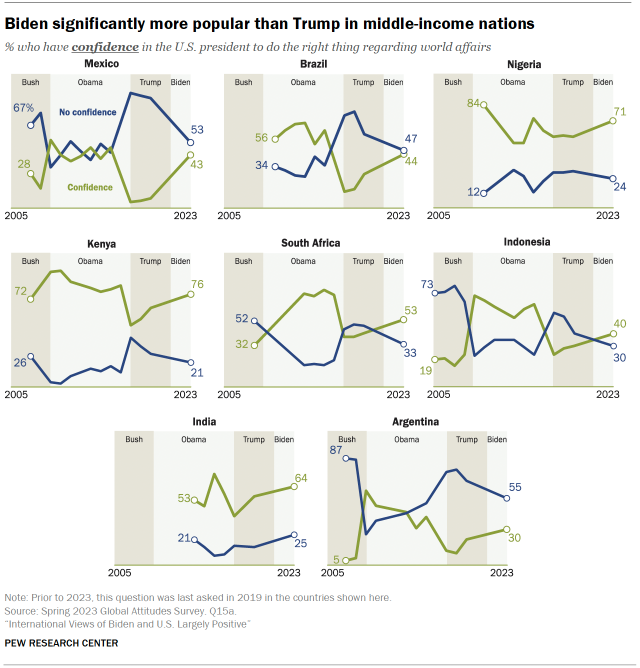
America’s role on the world stage
Since 2002, we have periodically included a question asking respondents whether they believe the U.S. takes into account the interests of countries like theirs when making foreign policy decisions. And typically we’ve found that people do not think the U.S. considers their interests.
Views are divided in the current survey, with a median of 49% across 23 countries saying the U.S. takes into account their interests a great deal or fair amount, and 50% saying it considers their interests not very much or not at all.
However, in many nations, the share of the public that thinks the U.S. listens to countries like theirs has been on the rise, and in 12 countries, it is at the highest point we’ve seen in any of our surveys. For instance, in Poland, Germany and the United Kingdom – three key NATO allies of the U.S. – the share saying the U.S. considers their interests is larger now than at any point over the past two decades.
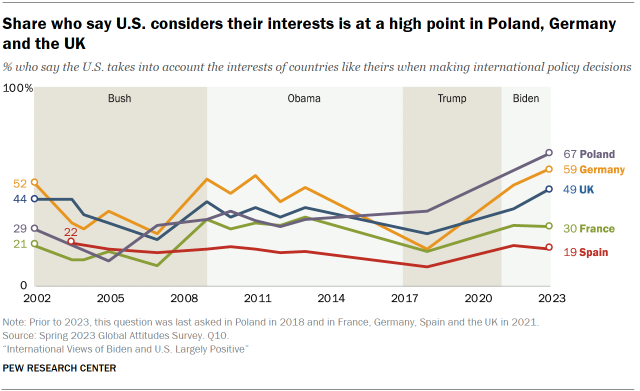
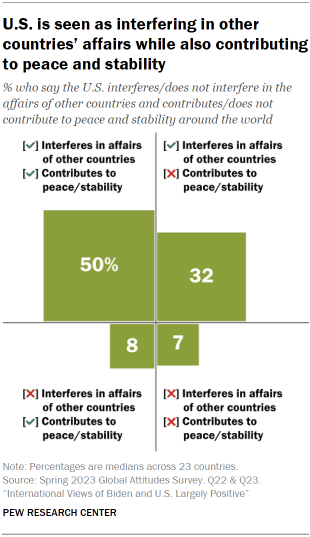
In addition to the question on whether the U.S. considers other countries’ interests, the survey included two other questions about America’s role in global politics. First, we asked about how much the U.S. interferes in the affairs of other countries. Second, we asked about how much the U.S. contributes to peace and stability around the world.
Looking at the two questions together highlights the complex views people often hold about the U.S. and the ways in which people see both positive and negative aspects to the role America plays on the world stage.
A median of 50% across the 23 nations surveyed say both that the U.S. interferes a great deal or fair amount in the affairs of other countries and that it contributes a great deal or fair amount to peace and stability around the world.
About one-in-three believe the U.S. interferes but does not contribute to global peace and stability. Half or more have this position in Greece, Hungary and Italy.
Relatively few believe the U.S. does not meddle in the politics of other nations.
American soft power
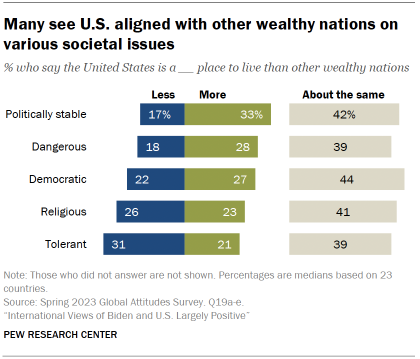
The survey included a number of questions on social, political and economic aspects of America’s image – things that are often considered a part of U.S. “soft power.”
For instance, when asked how politically stable, dangerous, democratic, religious and tolerant the U.S. is, respondents generally say it is about the same as other affluent nations. But a sizable number believe the U.S. is more politically stable, including half or more in Poland, Nigeria and Israel. Still, four-in-ten or more see the U.S. as less stable in Australia, Sweden and the Netherlands.
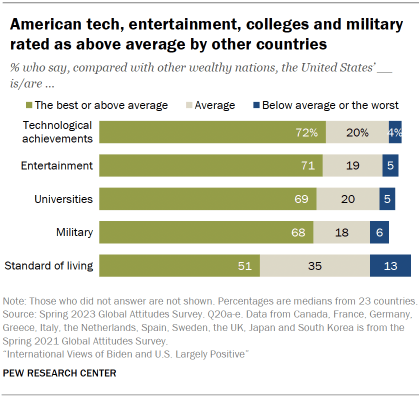
While on the negative side, many think it is a less tolerant and more dangerous place to live compared with other wealthy countries. Nearly two-thirds of Australians believe the U.S. is a more dangerous place to live, and at least half hold this view in the UK, Spain and Germany.
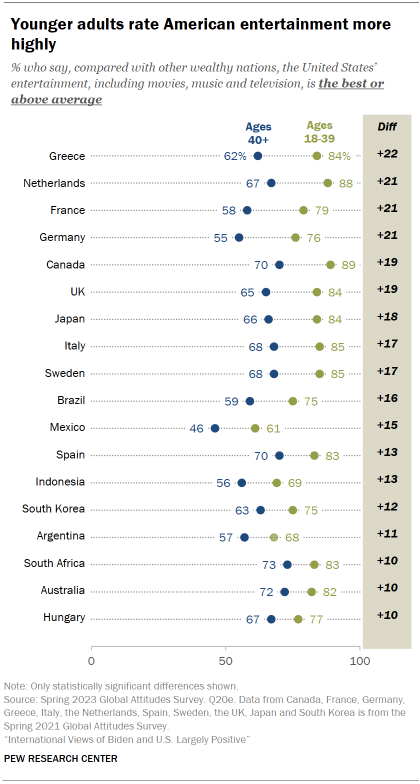
Respondents generally think America’s technology, entertainment, universities and military are the best or above average when compared with other affluent nations.
The U.S. receives lower marks for its standard of living, although 51% say it is the best or better than average.
As a separate analysis shows, only 44% of Americans think the United States’ standard of living is the best or above average. Americans are also less likely than others around the world to praise their technological achievements and universities.
Younger adults are especially likely to embrace U.S. popular culture. In 18 nations, adults ages 18 to 39 are more likely than older adults to say American movies, music and television are the best or above average.
For instance, 84% of Greeks under 40 say American entertainment is the best or better than average, compared with 62% of those ages 40 and older.
While young people are more positive than older adults about American entertainment, they express greater concerns about safety in the U.S.
In 12 nations, those under 40 are particularly likely to say the U.S. is a more dangerous place to live than other wealthy nations. In the Netherlands, for example, 61% of 18- to 39-year-olds say the U.S. is more dangerous, while just 34% of those 40 and older agree.
U.S. economic power
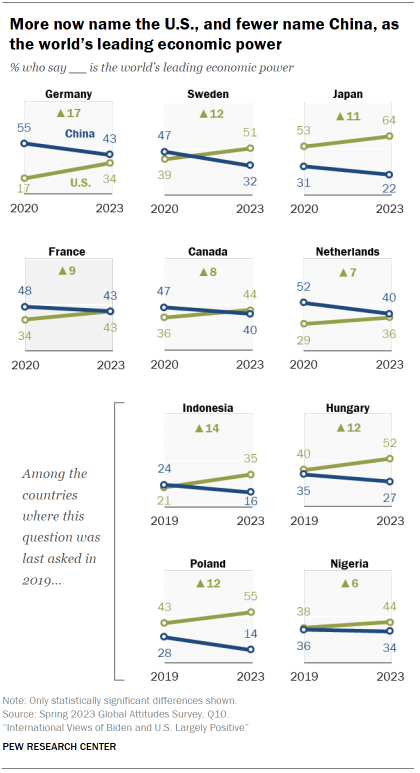
The global economy has experienced a number of severe shocks in recent years, with many nations suffering recessions after the outbreak of COVID-19, followed by high inflation as the world emerged from the pandemic. There has also been a shift over the past few years in perceptions of global economic power. In several countries, people have become more likely to name the U.S., rather than China, as the world’s top economy.
Overall, a median of 41% across the 23 nations polled believe the U.S. is the world’s leading economic power, while 33% name China. The share who say the U.S. is the world’s leading economic power has increased significantly since 2020 in Germany, Sweden, Japan, France, Canada and the Netherlands.
It has also increased in Indonesia, Hungary, Poland and Nigeria since 2019, the last time the question was asked in those countries.
The survey also includes a question in middle-income nations about American investment in their countries. Across eight nations, a median of 68% say U.S. investment has benefited their countries’ economies a great deal or a fair amount. Assessments are especially positive in Nigeria, Kenya, India and Mexico, where seven-in-ten or more hold this view. Argentina is the only nation polled where a majority believe U.S. investment has been bad for their country.
Spotlight: America’s image improves in Mexico
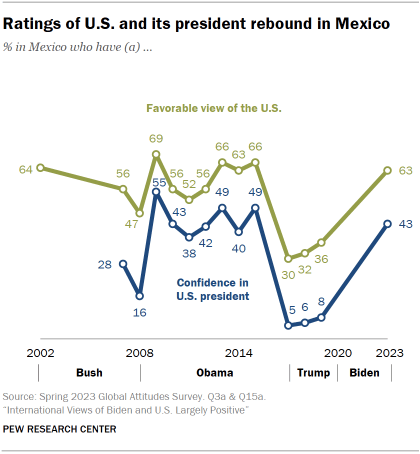
Since we last surveyed Mexico in 2019, there has been a sharp turnaround in Mexican attitudes toward the U.S. During Trump’s presidency, ratings for the U.S. declined significantly in many nations across the globe, including Mexico, where Trump and his policies – especially his proposal to build a wall on the border with Mexico – were extremely unpopular. In 2017, 2018 and 2019, the share of the Mexican public that expressed confidence in Trump was in the single digits and the lowest rating for Trump each year in our annual cross-national survey was in Mexico.
Today, Biden’s ratings in Mexico are not especially high – 43% have confidence in him – but they are considerably higher than Trump’s were, and they are in line with the assessments Barack Obama received when he was in the White House. Similarly, overall ratings for the U.S. have rebounded to roughly where they were during Obama’s second term.
Spotlight: Differing views of the U.S. in central Europe
In recent years, Poland and Hungary have featured prominently in discussions about the rise of populism in Europe. Both countries have governments controlled by right-wing populist parties – Law and Justice (PiS) in Poland and Fidesz in Hungary – both have had tensions with the European Union over domestic policies and both have experienced a deterioration in the quality of their democracy according to research organizations such as International IDEA, the Economist Intelligence Unit and Freedom House.
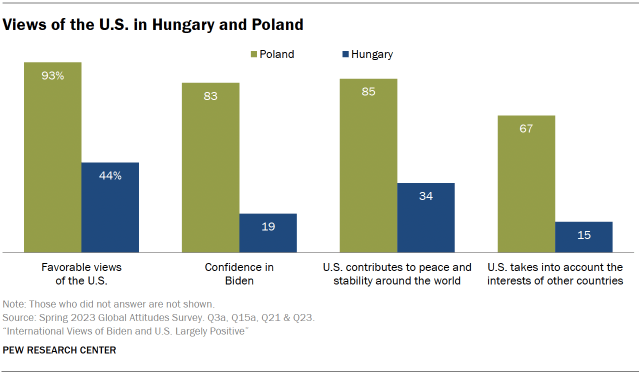
However, the two countries look very different when it comes to public opinion about international affairs, including views about the U.S. Poles have generally had relatively favorable attitudes about the U.S. in our surveys over the past two decades, but since Russia’s invasion of Ukraine, Polish attitudes have become even more positive. And in the current survey, Poles are consistently at or near the top of the list, in terms of expressing positive views about the U.S.
Hungarians, in contrast, are consistently at the bottom. They give Biden his lowest rating, and Hungary is the only country where fewer than half have a favorable opinion of the U.S. They are the least likely to think the U.S. considers their interests when making foreign policy and the most likely to believe the U.S. does not contribute to peace and stability around the world. Often, these negative views are especially common among supporters of Prime Minister Viktor Orbán’s Fidesz party.
Road map to the report
The chapters that follow discuss these findings and others in more detail:
- Chapter 1 looks at overall opinion of the U.S. across the countries surveyed, including how perceptions have shifted over the years
- Chapter 2 examines confidence in U.S. President Joe Biden to do the right thing in world affairs and how ratings of Biden compare with those of former presidents Donald Trump and Barack Obama
- Chapter 3 considers the negative and positive roles the U.S. plays in international affairs




